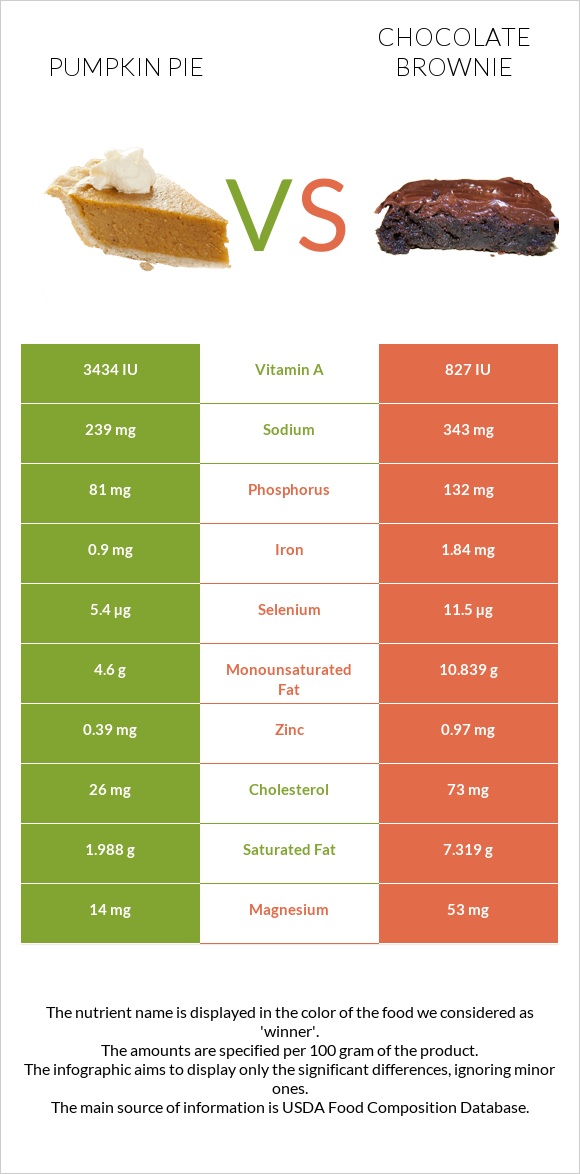Pumpkin pie vs. Chocolate brownie — In-Depth Nutrition Comparison
Compare
Significant differences between pumpkin pie and chocolate brownie
- Pumpkin pie has more vitamin A and vitamin B12; however, chocolate brownie is richer in copper, manganese, iron, selenium, magnesium, and phosphorus.
- Pumpkin pie covers your daily vitamin A needs 52% more than chocolate brownie.
- Chocolate brownie has 2 times less vitamin B12 than pumpkin pie. Pumpkin pie has 0.35µg of vitamin B12, while chocolate brownie has 0.16µg.
- Pumpkin pie contains less cholesterol.
- Pumpkin pie has a higher glycemic index. The glycemic index of pumpkin pie is 59, while the glycemic index of chocolate brownie is 42.
Specific food types used in this comparison are Pie, pumpkin, commercially prepared and Cookies, brownies, prepared from recipe.
Infographic

Infographic link
Mineral Comparison
Mineral comparison score is based on the number of minerals by which one or the other food is richer. The "coverage" charts below show how much of the daily needs can be covered by 300 grams of the food.
| Contains more CalciumCalcium | +12.3% |
| Contains less SodiumSodium | -30.3% |
| Contains more MagnesiumMagnesium | +278.6% |
| Contains more IronIron | +104.4% |
| Contains more CopperCopper | +162.2% |
| Contains more ZincZinc | +148.7% |
| Contains more PhosphorusPhosphorus | +63% |
| Contains more ManganeseManganese | +158.6% |
| Contains more SeleniumSelenium | +113% |
Vitamin Comparison
Vitamin comparison score is based on the number of vitamins by which one or the other food is richer. The "coverage" charts below show how much of the daily needs can be covered by 300 grams of the food.
| Contains more Vitamin AVitamin A | +154.5% |
| Contains more Vitamin EVitamin E | +∞% |
| Contains more Vitamin DVitamin D | +∞% |
| Contains more Vitamin B1Vitamin B1 | +25.5% |
| Contains more Vitamin B3Vitamin B3 | +12.7% |
| Contains more Vitamin B5Vitamin B5 | +37.8% |
| Contains more Vitamin B12Vitamin B12 | +118.8% |
| Contains more Vitamin KVitamin K | +∞% |
| Contains more Vitamin CVitamin C | +∞% |
| Contains more Vitamin B2Vitamin B2 | +53.2% |
| Contains more Vitamin B6Vitamin B6 | +49.2% |
| Contains more FolateFolate | +11.5% |
All nutrients comparison - raw data values
| Nutrient |  |
 |
DV% diff. |
| Polyunsaturated fat | 1.77g | 9.412g | 51% |
| Fats | 9.75g | 29.1g | 30% |
| Vitamin A | 448µg | 176µg | 30% |
| Copper | 0.148mg | 0.388mg | 27% |
| Saturated fat | 1.988g | 7.319g | 24% |
| Cholesterol | 26mg | 73mg | 16% |
| Manganese | 0.227mg | 0.587mg | 16% |
| Monounsaturated fat | 4.6g | 10.839g | 16% |
| Iron | 0.9mg | 1.84mg | 12% |
| Calories | 243kcal | 466kcal | 11% |
| Selenium | 5.4µg | 11.5µg | 11% |
| Vitamin K | 13.2µg | 11% | |
| Magnesium | 14mg | 53mg | 9% |
| Vitamin B12 | 0.35µg | 0.16µg | 8% |
| Fiber | 1.8g | 7% | |
| Phosphorus | 81mg | 132mg | 7% |
| Choline | 37.5mg | 7% | |
| Protein | 3.9g | 6.2g | 5% |
| Carbs | 34.83g | 50.2g | 5% |
| Zinc | 0.39mg | 0.97mg | 5% |
| Sodium | 239mg | 343mg | 5% |
| Vitamin E | 0.76mg | 5% | |
| Vitamin B2 | 0.124mg | 0.19mg | 5% |
| Starch | 10.73g | 4% | |
| Fructose | 2.85g | 4% | |
| Vitamin B1 | 0.177mg | 0.141mg | 3% |
| Vitamin B5 | 0.452mg | 0.328mg | 2% |
| Vitamin B6 | 0.063mg | 0.094mg | 2% |
| Calcium | 64mg | 57mg | 1% |
| Vitamin D | 0.1µg | 1% | |
| Vitamin B3 | 1.107mg | 0.982mg | 1% |
| Folate | 26µg | 29µg | 1% |
| Vitamin C | 0mg | 0.3mg | 0% |
| Net carbs | 33.03g | 50.2g | N/A |
| Vitamin D | 2 IU | 0% | |
| Potassium | 167mg | 176mg | 0% |
| Sugar | 18.88g | N/A | |
| Tryptophan | 0.048mg | 0.078mg | 0% |
| Threonine | 0.154mg | 0.228mg | 0% |
| Isoleucine | 0.158mg | 0.265mg | 0% |
| Leucine | 0.297mg | 0.447mg | 0% |
| Lysine | 0.192mg | 0.283mg | 0% |
| Methionine | 0.249mg | 0.132mg | 0% |
| Phenylalanine | 0.175mg | 0.298mg | 0% |
| Valine | 0.211mg | 0.323mg | 0% |
| Histidine | 0.088mg | 0.136mg | 0% |
| Omega-3 - EPA | 0g | 0.001g | N/A |
| Omega-3 - DHA | 0g | 0.006g | N/A |
Macronutrient Comparison
Macronutrient breakdown side-by-side comparison
Protein:
3.9 g
Fats:
9.75 g
Carbs:
34.83 g
Water:
50.39 g
Other:
1.13 g
Protein:
6.2 g
Fats:
29.1 g
Carbs:
50.2 g
Water:
12.6 g
Other:
1.9 g
| Contains more WaterWater | +299.9% |
| Contains more ProteinProtein | +59% |
| Contains more FatsFats | +198.5% |
| Contains more CarbsCarbs | +44.1% |
| Contains more OtherOther | +68.1% |
Fat Type Comparison
Fat type breakdown side-by-side comparison
Saturated fat:
Sat. Fat
1.988 g
Monounsaturated fat:
Mono. Fat
4.6 g
Polyunsaturated fat:
Poly. Fat
1.77 g
Saturated fat:
Sat. Fat
7.319 g
Monounsaturated fat:
Mono. Fat
10.839 g
Polyunsaturated fat:
Poly. Fat
9.412 g
| Contains less Sat. FatSaturated fat | -72.8% |
| Contains more Mono. FatMonounsaturated fat | +135.6% |
| Contains more Poly. FatPolyunsaturated fat | +431.8% |





